STSU 1100: A Comparative Study of Online and Traditional Learning
VerifiedAdded on 2023/05/30
|7
|1451
|120
Essay
AI Summary
This essay provides a comparative analysis of online and traditional learning methods, addressing the ongoing debate among students, researchers, and educators. It explores the advantages of online learning, such as time and money savings, flexibility, and convenience, particularly for working professionals and individuals with family responsibilities. Traditional learning is examined for its benefits in fostering discipline, motivation, and social interaction through face-to-face communication with instructors and peers. The essay emphasizes that both methods have their strengths and weaknesses, making it crucial for students to consider their personal preferences, conveniences, and agendas when choosing an educational medium. The analysis draws upon various research articles and studies to support its claims, ultimately concluding that the optimal choice depends on individual needs and circumstances.
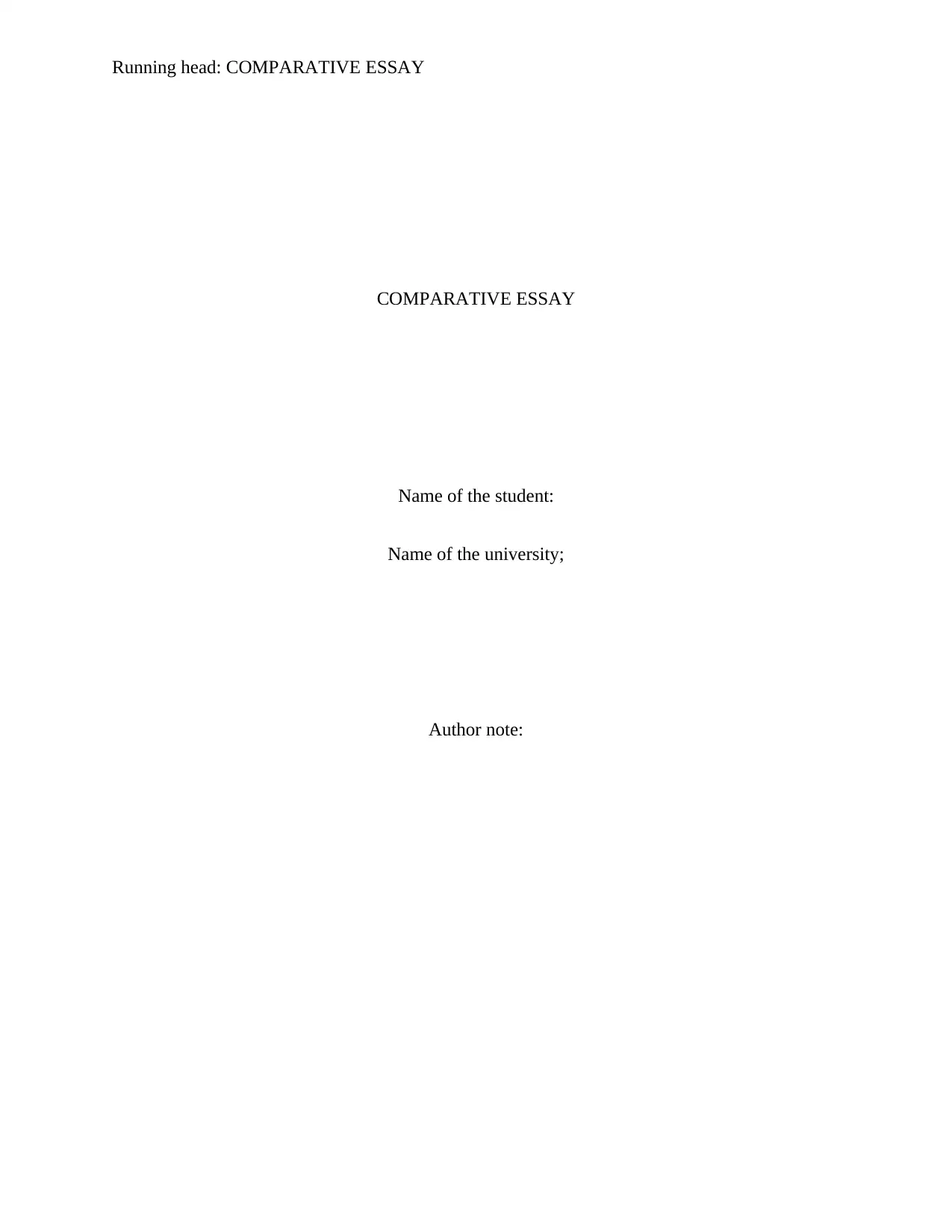
Running head: COMPARATIVE ESSAY
COMPARATIVE ESSAY
Name of the student:
Name of the university;
Author note:
COMPARATIVE ESSAY
Name of the student:
Name of the university;
Author note:
Paraphrase This Document
Need a fresh take? Get an instant paraphrase of this document with our AI Paraphraser
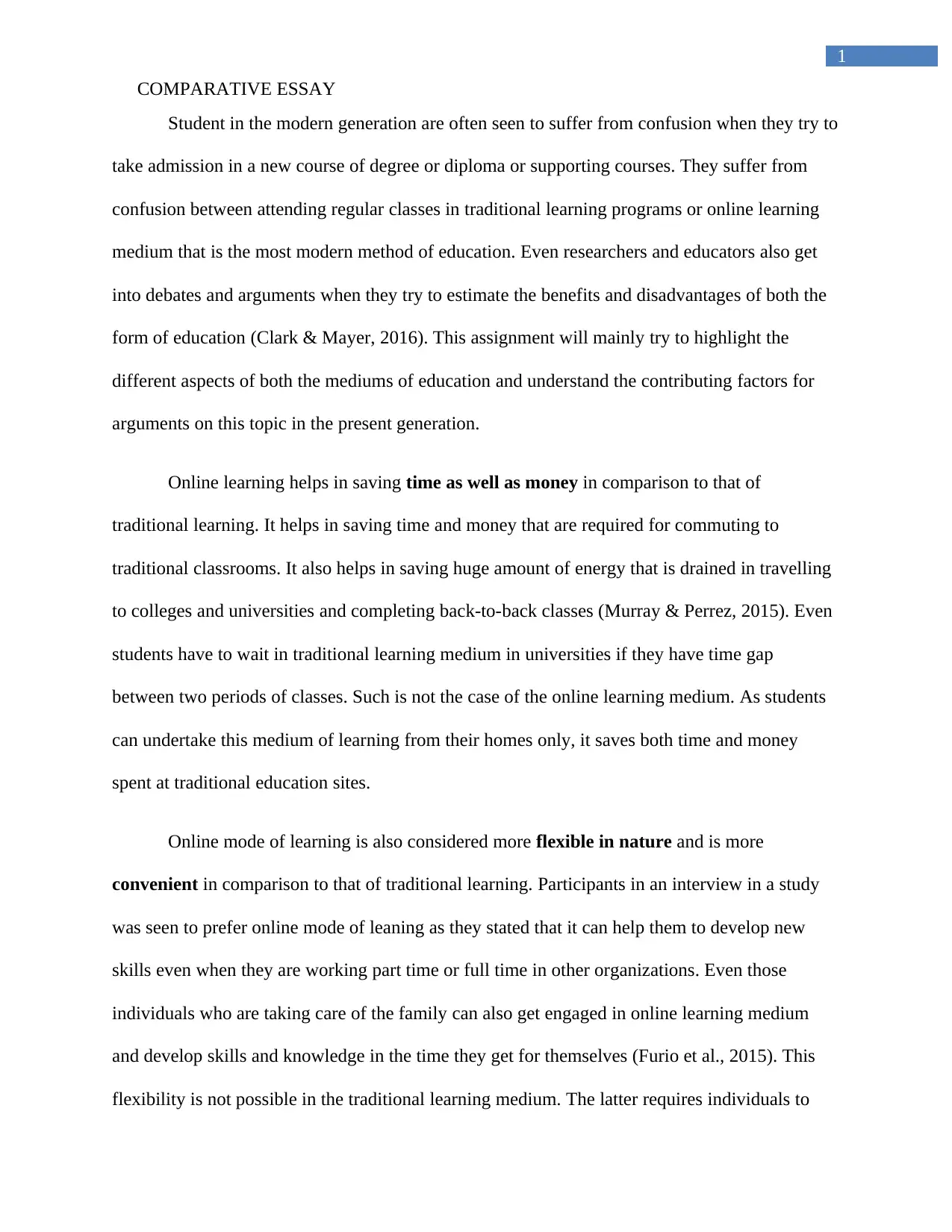
1
COMPARATIVE ESSAY
Student in the modern generation are often seen to suffer from confusion when they try to
take admission in a new course of degree or diploma or supporting courses. They suffer from
confusion between attending regular classes in traditional learning programs or online learning
medium that is the most modern method of education. Even researchers and educators also get
into debates and arguments when they try to estimate the benefits and disadvantages of both the
form of education (Clark & Mayer, 2016). This assignment will mainly try to highlight the
different aspects of both the mediums of education and understand the contributing factors for
arguments on this topic in the present generation.
Online learning helps in saving time as well as money in comparison to that of
traditional learning. It helps in saving time and money that are required for commuting to
traditional classrooms. It also helps in saving huge amount of energy that is drained in travelling
to colleges and universities and completing back-to-back classes (Murray & Perrez, 2015). Even
students have to wait in traditional learning medium in universities if they have time gap
between two periods of classes. Such is not the case of the online learning medium. As students
can undertake this medium of learning from their homes only, it saves both time and money
spent at traditional education sites.
Online mode of learning is also considered more flexible in nature and is more
convenient in comparison to that of traditional learning. Participants in an interview in a study
was seen to prefer online mode of leaning as they stated that it can help them to develop new
skills even when they are working part time or full time in other organizations. Even those
individuals who are taking care of the family can also get engaged in online learning medium
and develop skills and knowledge in the time they get for themselves (Furio et al., 2015). This
flexibility is not possible in the traditional learning medium. The latter requires individuals to
COMPARATIVE ESSAY
Student in the modern generation are often seen to suffer from confusion when they try to
take admission in a new course of degree or diploma or supporting courses. They suffer from
confusion between attending regular classes in traditional learning programs or online learning
medium that is the most modern method of education. Even researchers and educators also get
into debates and arguments when they try to estimate the benefits and disadvantages of both the
form of education (Clark & Mayer, 2016). This assignment will mainly try to highlight the
different aspects of both the mediums of education and understand the contributing factors for
arguments on this topic in the present generation.
Online learning helps in saving time as well as money in comparison to that of
traditional learning. It helps in saving time and money that are required for commuting to
traditional classrooms. It also helps in saving huge amount of energy that is drained in travelling
to colleges and universities and completing back-to-back classes (Murray & Perrez, 2015). Even
students have to wait in traditional learning medium in universities if they have time gap
between two periods of classes. Such is not the case of the online learning medium. As students
can undertake this medium of learning from their homes only, it saves both time and money
spent at traditional education sites.
Online mode of learning is also considered more flexible in nature and is more
convenient in comparison to that of traditional learning. Participants in an interview in a study
was seen to prefer online mode of leaning as they stated that it can help them to develop new
skills even when they are working part time or full time in other organizations. Even those
individuals who are taking care of the family can also get engaged in online learning medium
and develop skills and knowledge in the time they get for themselves (Furio et al., 2015). This
flexibility is not possible in the traditional learning medium. The latter requires individuals to
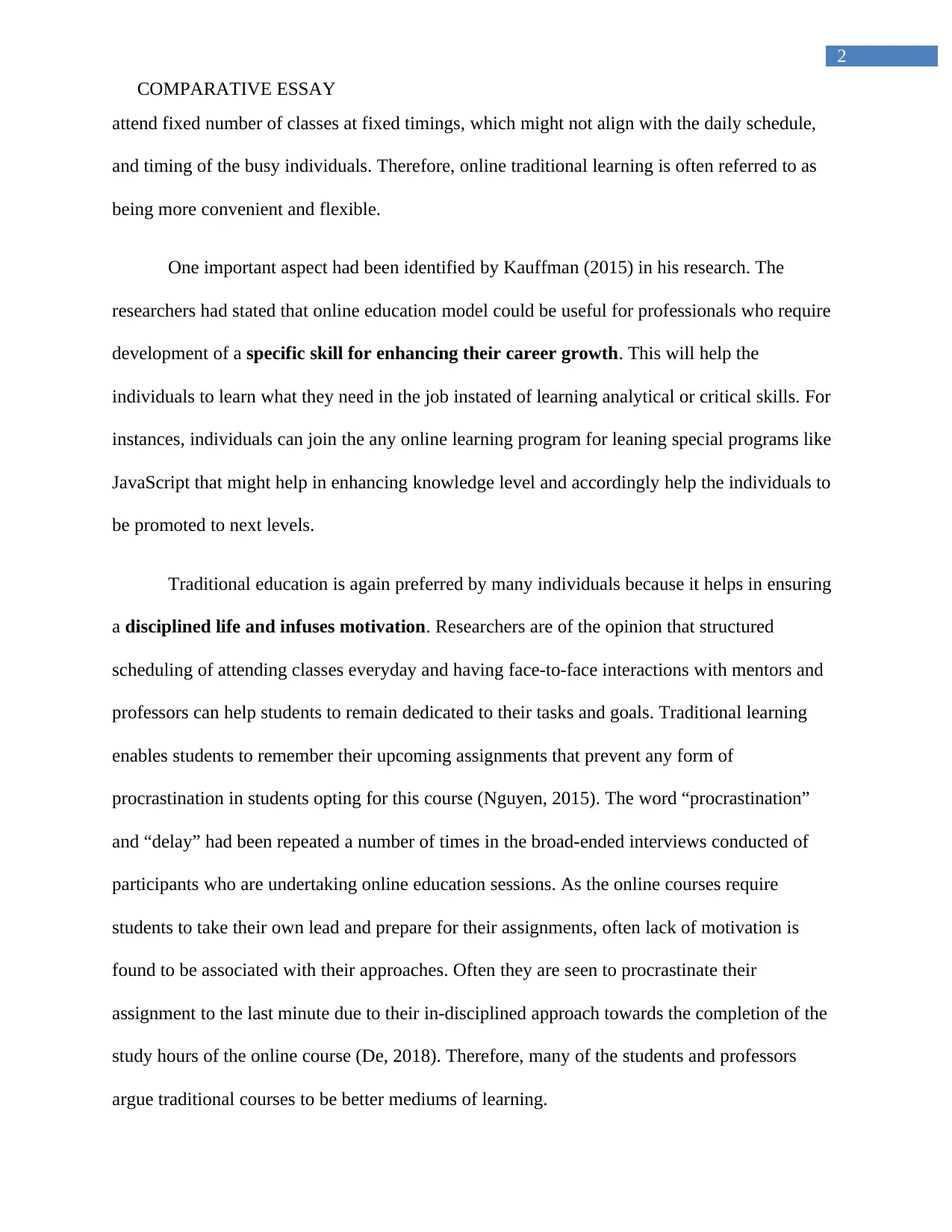
2
COMPARATIVE ESSAY
attend fixed number of classes at fixed timings, which might not align with the daily schedule,
and timing of the busy individuals. Therefore, online traditional learning is often referred to as
being more convenient and flexible.
One important aspect had been identified by Kauffman (2015) in his research. The
researchers had stated that online education model could be useful for professionals who require
development of a specific skill for enhancing their career growth. This will help the
individuals to learn what they need in the job instated of learning analytical or critical skills. For
instances, individuals can join the any online learning program for leaning special programs like
JavaScript that might help in enhancing knowledge level and accordingly help the individuals to
be promoted to next levels.
Traditional education is again preferred by many individuals because it helps in ensuring
a disciplined life and infuses motivation. Researchers are of the opinion that structured
scheduling of attending classes everyday and having face-to-face interactions with mentors and
professors can help students to remain dedicated to their tasks and goals. Traditional learning
enables students to remember their upcoming assignments that prevent any form of
procrastination in students opting for this course (Nguyen, 2015). The word “procrastination”
and “delay” had been repeated a number of times in the broad-ended interviews conducted of
participants who are undertaking online education sessions. As the online courses require
students to take their own lead and prepare for their assignments, often lack of motivation is
found to be associated with their approaches. Often they are seen to procrastinate their
assignment to the last minute due to their in-disciplined approach towards the completion of the
study hours of the online course (De, 2018). Therefore, many of the students and professors
argue traditional courses to be better mediums of learning.
COMPARATIVE ESSAY
attend fixed number of classes at fixed timings, which might not align with the daily schedule,
and timing of the busy individuals. Therefore, online traditional learning is often referred to as
being more convenient and flexible.
One important aspect had been identified by Kauffman (2015) in his research. The
researchers had stated that online education model could be useful for professionals who require
development of a specific skill for enhancing their career growth. This will help the
individuals to learn what they need in the job instated of learning analytical or critical skills. For
instances, individuals can join the any online learning program for leaning special programs like
JavaScript that might help in enhancing knowledge level and accordingly help the individuals to
be promoted to next levels.
Traditional education is again preferred by many individuals because it helps in ensuring
a disciplined life and infuses motivation. Researchers are of the opinion that structured
scheduling of attending classes everyday and having face-to-face interactions with mentors and
professors can help students to remain dedicated to their tasks and goals. Traditional learning
enables students to remember their upcoming assignments that prevent any form of
procrastination in students opting for this course (Nguyen, 2015). The word “procrastination”
and “delay” had been repeated a number of times in the broad-ended interviews conducted of
participants who are undertaking online education sessions. As the online courses require
students to take their own lead and prepare for their assignments, often lack of motivation is
found to be associated with their approaches. Often they are seen to procrastinate their
assignment to the last minute due to their in-disciplined approach towards the completion of the
study hours of the online course (De, 2018). Therefore, many of the students and professors
argue traditional courses to be better mediums of learning.
⊘ This is a preview!⊘
Do you want full access?
Subscribe today to unlock all pages.

Trusted by 1+ million students worldwide
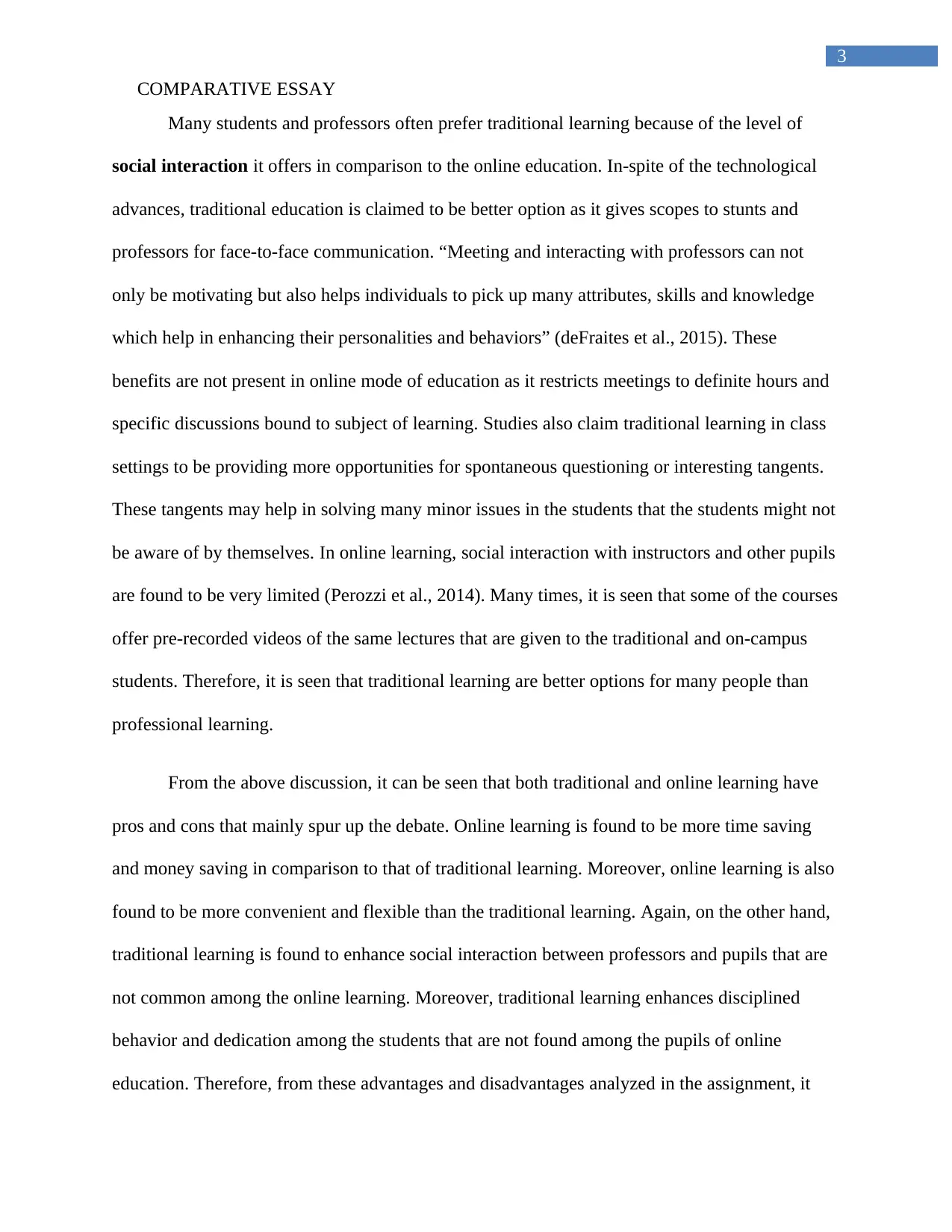
3
COMPARATIVE ESSAY
Many students and professors often prefer traditional learning because of the level of
social interaction it offers in comparison to the online education. In-spite of the technological
advances, traditional education is claimed to be better option as it gives scopes to stunts and
professors for face-to-face communication. “Meeting and interacting with professors can not
only be motivating but also helps individuals to pick up many attributes, skills and knowledge
which help in enhancing their personalities and behaviors” (deFraites et al., 2015). These
benefits are not present in online mode of education as it restricts meetings to definite hours and
specific discussions bound to subject of learning. Studies also claim traditional learning in class
settings to be providing more opportunities for spontaneous questioning or interesting tangents.
These tangents may help in solving many minor issues in the students that the students might not
be aware of by themselves. In online learning, social interaction with instructors and other pupils
are found to be very limited (Perozzi et al., 2014). Many times, it is seen that some of the courses
offer pre-recorded videos of the same lectures that are given to the traditional and on-campus
students. Therefore, it is seen that traditional learning are better options for many people than
professional learning.
From the above discussion, it can be seen that both traditional and online learning have
pros and cons that mainly spur up the debate. Online learning is found to be more time saving
and money saving in comparison to that of traditional learning. Moreover, online learning is also
found to be more convenient and flexible than the traditional learning. Again, on the other hand,
traditional learning is found to enhance social interaction between professors and pupils that are
not common among the online learning. Moreover, traditional learning enhances disciplined
behavior and dedication among the students that are not found among the pupils of online
education. Therefore, from these advantages and disadvantages analyzed in the assignment, it
COMPARATIVE ESSAY
Many students and professors often prefer traditional learning because of the level of
social interaction it offers in comparison to the online education. In-spite of the technological
advances, traditional education is claimed to be better option as it gives scopes to stunts and
professors for face-to-face communication. “Meeting and interacting with professors can not
only be motivating but also helps individuals to pick up many attributes, skills and knowledge
which help in enhancing their personalities and behaviors” (deFraites et al., 2015). These
benefits are not present in online mode of education as it restricts meetings to definite hours and
specific discussions bound to subject of learning. Studies also claim traditional learning in class
settings to be providing more opportunities for spontaneous questioning or interesting tangents.
These tangents may help in solving many minor issues in the students that the students might not
be aware of by themselves. In online learning, social interaction with instructors and other pupils
are found to be very limited (Perozzi et al., 2014). Many times, it is seen that some of the courses
offer pre-recorded videos of the same lectures that are given to the traditional and on-campus
students. Therefore, it is seen that traditional learning are better options for many people than
professional learning.
From the above discussion, it can be seen that both traditional and online learning have
pros and cons that mainly spur up the debate. Online learning is found to be more time saving
and money saving in comparison to that of traditional learning. Moreover, online learning is also
found to be more convenient and flexible than the traditional learning. Again, on the other hand,
traditional learning is found to enhance social interaction between professors and pupils that are
not common among the online learning. Moreover, traditional learning enhances disciplined
behavior and dedication among the students that are not found among the pupils of online
education. Therefore, from these advantages and disadvantages analyzed in the assignment, it
Paraphrase This Document
Need a fresh take? Get an instant paraphrase of this document with our AI Paraphraser
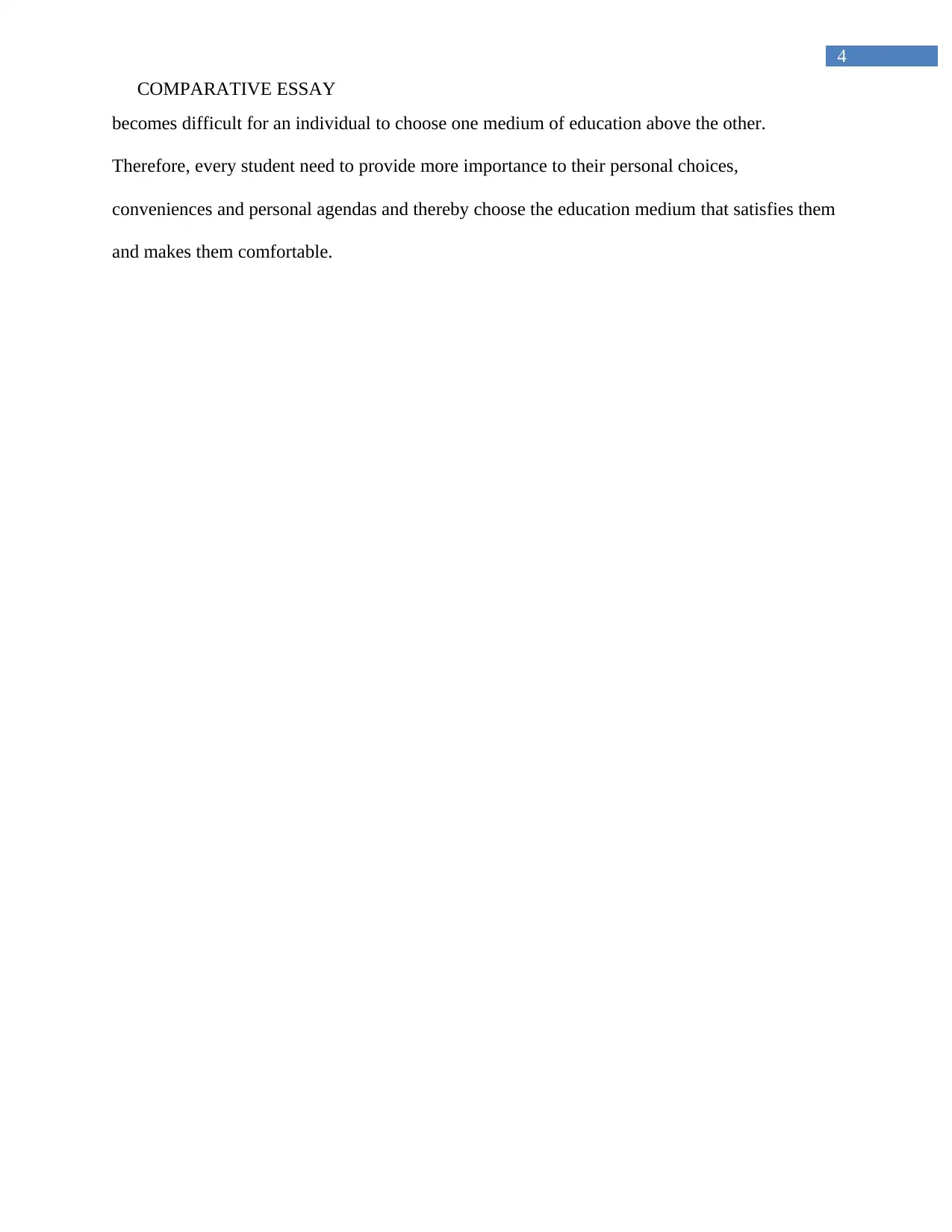
4
COMPARATIVE ESSAY
becomes difficult for an individual to choose one medium of education above the other.
Therefore, every student need to provide more importance to their personal choices,
conveniences and personal agendas and thereby choose the education medium that satisfies them
and makes them comfortable.
COMPARATIVE ESSAY
becomes difficult for an individual to choose one medium of education above the other.
Therefore, every student need to provide more importance to their personal choices,
conveniences and personal agendas and thereby choose the education medium that satisfies them
and makes them comfortable.
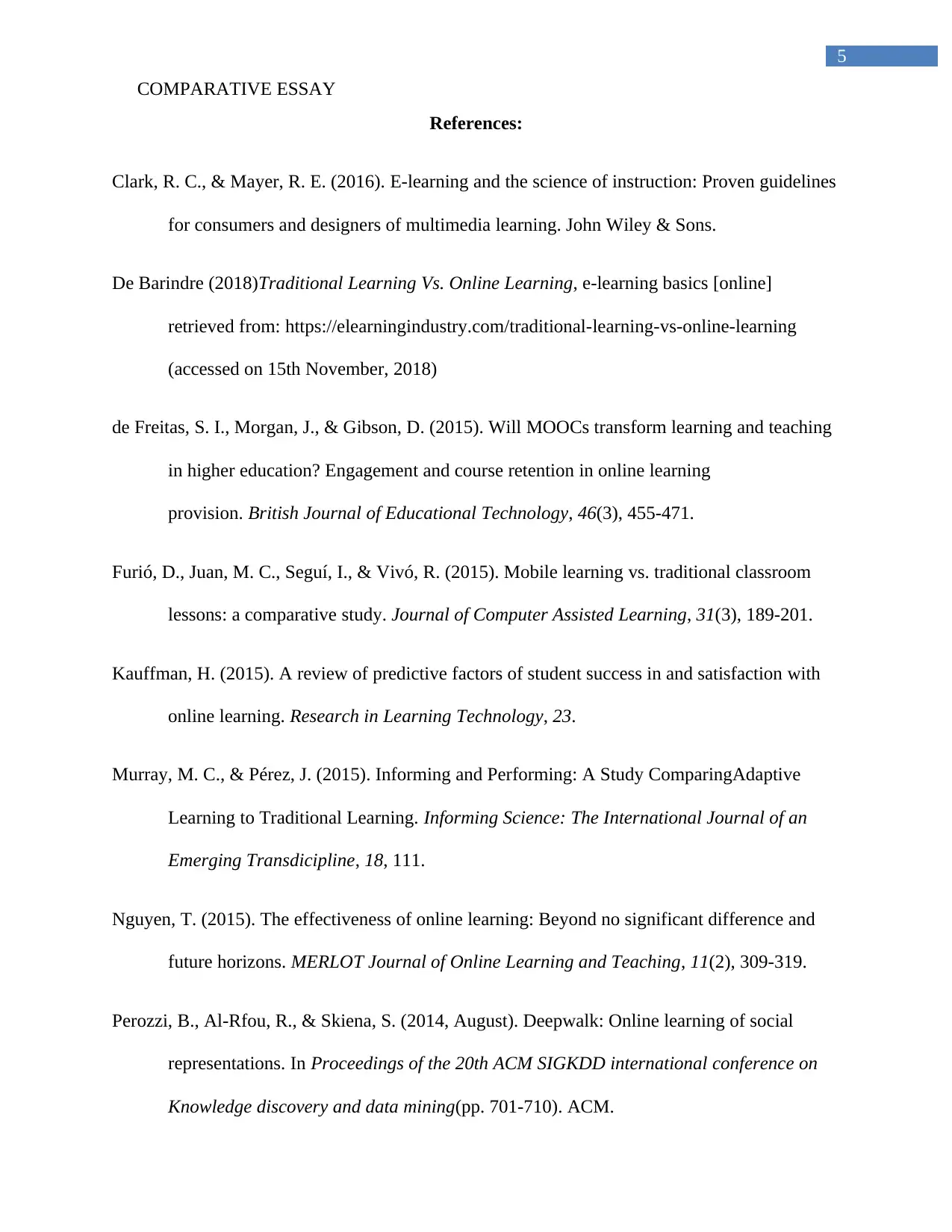
5
COMPARATIVE ESSAY
References:
Clark, R. C., & Mayer, R. E. (2016). E-learning and the science of instruction: Proven guidelines
for consumers and designers of multimedia learning. John Wiley & Sons.
De Barindre (2018)Traditional Learning Vs. Online Learning, e-learning basics [online]
retrieved from: https://elearningindustry.com/traditional-learning-vs-online-learning
(accessed on 15th November, 2018)
de Freitas, S. I., Morgan, J., & Gibson, D. (2015). Will MOOCs transform learning and teaching
in higher education? Engagement and course retention in online learning
provision. British Journal of Educational Technology, 46(3), 455-471.
Furió, D., Juan, M. C., Seguí, I., & Vivó, R. (2015). Mobile learning vs. traditional classroom
lessons: a comparative study. Journal of Computer Assisted Learning, 31(3), 189-201.
Kauffman, H. (2015). A review of predictive factors of student success in and satisfaction with
online learning. Research in Learning Technology, 23.
Murray, M. C., & Pérez, J. (2015). Informing and Performing: A Study ComparingAdaptive
Learning to Traditional Learning. Informing Science: The International Journal of an
Emerging Transdicipline, 18, 111.
Nguyen, T. (2015). The effectiveness of online learning: Beyond no significant difference and
future horizons. MERLOT Journal of Online Learning and Teaching, 11(2), 309-319.
Perozzi, B., Al-Rfou, R., & Skiena, S. (2014, August). Deepwalk: Online learning of social
representations. In Proceedings of the 20th ACM SIGKDD international conference on
Knowledge discovery and data mining(pp. 701-710). ACM.
COMPARATIVE ESSAY
References:
Clark, R. C., & Mayer, R. E. (2016). E-learning and the science of instruction: Proven guidelines
for consumers and designers of multimedia learning. John Wiley & Sons.
De Barindre (2018)Traditional Learning Vs. Online Learning, e-learning basics [online]
retrieved from: https://elearningindustry.com/traditional-learning-vs-online-learning
(accessed on 15th November, 2018)
de Freitas, S. I., Morgan, J., & Gibson, D. (2015). Will MOOCs transform learning and teaching
in higher education? Engagement and course retention in online learning
provision. British Journal of Educational Technology, 46(3), 455-471.
Furió, D., Juan, M. C., Seguí, I., & Vivó, R. (2015). Mobile learning vs. traditional classroom
lessons: a comparative study. Journal of Computer Assisted Learning, 31(3), 189-201.
Kauffman, H. (2015). A review of predictive factors of student success in and satisfaction with
online learning. Research in Learning Technology, 23.
Murray, M. C., & Pérez, J. (2015). Informing and Performing: A Study ComparingAdaptive
Learning to Traditional Learning. Informing Science: The International Journal of an
Emerging Transdicipline, 18, 111.
Nguyen, T. (2015). The effectiveness of online learning: Beyond no significant difference and
future horizons. MERLOT Journal of Online Learning and Teaching, 11(2), 309-319.
Perozzi, B., Al-Rfou, R., & Skiena, S. (2014, August). Deepwalk: Online learning of social
representations. In Proceedings of the 20th ACM SIGKDD international conference on
Knowledge discovery and data mining(pp. 701-710). ACM.
⊘ This is a preview!⊘
Do you want full access?
Subscribe today to unlock all pages.

Trusted by 1+ million students worldwide

6
COMPARATIVE ESSAY
COMPARATIVE ESSAY
1 out of 7
Related Documents
Your All-in-One AI-Powered Toolkit for Academic Success.
+13062052269
info@desklib.com
Available 24*7 on WhatsApp / Email
![[object Object]](/_next/static/media/star-bottom.7253800d.svg)
Unlock your academic potential
Copyright © 2020–2026 A2Z Services. All Rights Reserved. Developed and managed by ZUCOL.





